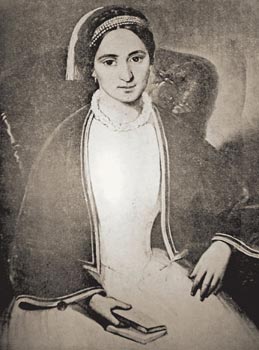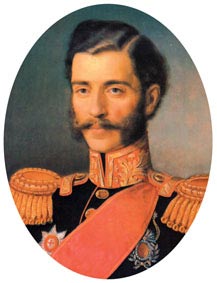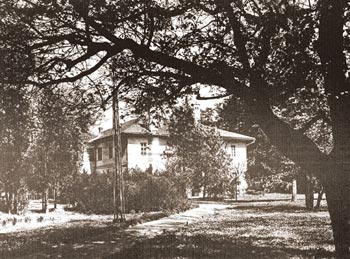| Fate and its commentaries
THE POET MILICA STOJADINOVIĆ-SRPKINJA (THE SERBIAN WOMAN, 1830-1878), ”THE PROUD DAUGHTER OF SREM”
The Tender Fairy of Fruška Gora
They came from the far to see her ”supernatural eyes”. Jovan Subotić and Ivan Mažuranić visited her, Johan Seibel dedicated her a song, Ljubomir P. Nenadović and Đorđe Rajković glorified her with their verses, Vuk called her his ”child of Fruška”, Prince Mihailo considered himself as her friend and protector, Metropolitan Mihailo personally invite her to Belgrade, a Njegoš said: ”I am a poet, she is a poet, if I were not a monk, there could be a Princess of Montenegro.” How did it happen that she died in misery and loneliness, surviving from taking away the gifts of the deceased on All Saint’s Day on Belgrade cemeteries? What has happened with her, what has happened with us?
By: Marina Matić
 Srem. The holy Fruška Gora. Bukovac and Vrdnik. The locations where starts the journey of the famous Serbian woman, Milica Stojadinović. It is not a coincidence that Milica originates from this Serbian pearl, full of holy monasteries and full of roads in pursuit for God, from the land of lighthouses and asylums, the land of a ”view of Serbia”. This area, with many stories, myth, history, knighthood and prayer, defined the life, the dreams, the ideals and the poetry of Milica Stojadinović. Srem. The holy Fruška Gora. Bukovac and Vrdnik. The locations where starts the journey of the famous Serbian woman, Milica Stojadinović. It is not a coincidence that Milica originates from this Serbian pearl, full of holy monasteries and full of roads in pursuit for God, from the land of lighthouses and asylums, the land of a ”view of Serbia”. This area, with many stories, myth, history, knighthood and prayer, defined the life, the dreams, the ideals and the poetry of Milica Stojadinović.
Milica the Serbian Poetess, Milica the ”Fairy of Vrdnik”, Milica Joan of Arc, Milica the Serbian sufferer. All of those faces are hidden in the tender personality of the brave Serbian woman, Milica, whom we remember again, with delay. Do we have the right not to recognize our great people in time or to surrender to oblivion and forget them when we want to?
Once, she was very respected, loved and praised. Her poetry is full of patriotism and pure, almost naive, excitement and inspiration. She belongs to the older generation of poets, the one which wrote in the 40s of the 19th century, but her sublime sensitivity for the Serbian people is closely connected to the poetry of Romanticism. However, Milica does not open her female heart; she does not reveal her dreams, her secrets. She says:
When the sky is stirring up, it does not say why,
Nor the rain falls,
And now my heart
Knows only of itself.
To whom can I express my feelings?
Or shall I rather die?
Famous people have come to Vrdnik, from the far, to visit her and to see her ”supernatural eyes”. She was Vuk’s young pupil, his ”daughter of Fruška” and she was a diligent collector of folk literature, wanting ”the world to see who the Serbs are”. She was a friend of Ludwig August Frankl, Johan Seibel dedicated a song to her, Jovan Subotić and Ivan Mažuranić visited her, Ljubomir P. Nenadović and Đorđe Rajković glorified her with their verses. Everyone knew about Milica, the Serbian poet. The great Njegoš said: ”I am a poet, she is a poet, if I were not a monk, there would be the Princess of Montenegro.” Prince Mihailo Obrenović considered her his friend and his court poet.
BETWEEN PARADISE AND DARKNESS  What had happened so that Milica became alone and forgotten? What had happened so that Milica became alone and forgotten?
There are two important and fateful moments that have marked Milica’s destiny, her life and her death. Two crossroads on the tragic road between Paradise and Darkness. The first moment was the sudden death of Prince Mihailo and the other was the final departure from Vrdnik to Belgrade, several years before she died.
The death of Prince Mihailo was a great shock not only for Milica but for many other great people of that time and for Serbia as well. It seemed that the young and fresh freedom and culture of Serbia have been interrupted with the death of the Prince. Milica never took off her mourning clothing. Anastas Jovanović retired from the public life and he never appeared again until his death, even if King Milan asked him to stay with the court. Many great Serbs died that year. Vuk, Branko Radičević (some time earlier), Ljubomir Nenadović, Jovan Sterija Popović. Behind them stands an empty space which was not easy to fill.
With the death of Prince Mihailo, Milica lost a great friend, but a protector as well. Prince Mihailo respected her as a poet and he helped her in publishing her first collections of poems. Milica often remembered their long conversations, while she was on the court. She never recovered from the loss, but she stayed straight and tall in her suffering. She was more and more conquered by the feeling of distance; she used it to hide the truth that she has an irretrievable loss inside her heart. Since then, she floated in time and waiting for something to happen.
The other moment was her final departure from Vrdnik to Belgrade, which was forced. She was forced to leave because all she loved and what belonged to her was now someone else’s. In 1875, her brother sold her last vineyard and a bigger part of their family house. She could not stand it. She left her Paradise, as she often called it. These words may show how she really felt and they can express her pain: ”My spiritual life is over, over in every sense, and I am dead”. Or: ”I leave my paradise, without guilt or sin.”
It happens that landscapes and souls create each other and now, everything she loved became only a shadow and a thought.
WHERE IS OUR LITTLE HEART  She only lived for the idea that her people need her, her Serbs, to encourage them with her song and bandage their wounds with her own hands. With this idea, on the invitation of the Metropolitan Mihailo, she came to Belgrade. Some time later, she remembered the ramparts of Belgrade with tears that she saw entering Belgrade from the steamship ”Diana”, and this view was immortalized by her namesake Milica Mićić Dimovska in her novel The Last Fascinations of MSS: ”She felt as she was born again, as she was returned to herself after a long exile. A new homeland was in front of her. The homeland of the ancient country, she thought with tears in her eyes.” She only lived for the idea that her people need her, her Serbs, to encourage them with her song and bandage their wounds with her own hands. With this idea, on the invitation of the Metropolitan Mihailo, she came to Belgrade. Some time later, she remembered the ramparts of Belgrade with tears that she saw entering Belgrade from the steamship ”Diana”, and this view was immortalized by her namesake Milica Mićić Dimovska in her novel The Last Fascinations of MSS: ”She felt as she was born again, as she was returned to herself after a long exile. A new homeland was in front of her. The homeland of the ancient country, she thought with tears in her eyes.”
Prince Mihailo was gone, her protector, but she hoped for the understanding of rich and patriotic Serbian town families which could finance such a poet and artist. But, it was not like that at all!
Those were the same people who drove away Katarina Ivanović from Belgrade, the young painter, inspired with patriotism, in the 19th century. They drove her away with their indifference and looking down at her. People only asked her to paint portraits of Belgrade provincial fashionable women in rich and fashionable city clothing, hemmed with gold. One episode during her stay in Belgrade can show us how far went the underestimating of the young artist. One time, while painting one of the Serbian ladies in a landscape, the rain began to fall. The arrogant lady quickly entered her fiacre, leaving Katarina, the tender, subtle soul full of love for her young homeland. Katarina, that girl who dreamed of painting the heroic history of her people, just like Milica sang about it.
What did those ”arrogant ladies” knew about it? Did some one care about Katarina’s and Milica’s pain? Who ever thought about them? Belgrade, of which everyone dreamed and everyone longed for, could be so unfair and so cruel. Belgrade hurried to greet the so-called Joan of Arc in the figure of Jeanne Merkus and did not feel Milica, its heroic poet!
She was hurt. She moved away. Milica, the one who dedicated her life to the Serbian people, singing about ”Slav lime trees” as the trees of freedom, about Karađorđe, about Knićanin and his volunteers, about Commander Stevan Šupljikac, about the long gone Serbian kings and heroes, about Lazar, Obilić, Dušan. Yes, that is our Milica, the Serbian heroine, dying abandoned, forgotten. She sent her last months on cemeteries, walking slowly between crosses and living from taking away the gifts of the deceased on All Saint’s Day.
SPEECHES AND ALL SAINT’S DAYS Dimovska is talking about the horrible episode in Milica’s life:
”No one ever asked her if she was invited to the requiem and who invited her. They let her pass trough with awe, avoiding the physical contact, like she was a leper. She could fill her bag with food, it was even her duty. They would give her a piece of bread and some meat. She was not ashamed and she would take a bottle of brandy and performed the ritual, not returning the bottle on the table. While she was holding a speech, her voice trembled, like she was going to cry, and instead of her cried the women who served the gathered people.”
Milica died like all those who suffered a lot and lost everything, and the ones who then become free and peaceful, almost invulnerable. What ever they did, nothing could harm them.
Milica was not killed by poverty, by material grief. Who knows a woman well he knows that ”she lives in inspiration, in the eye of a man, in the liquid love of wine”. Milica lived in the inspiration for her young Serbia, for its heroic history and its heroes, in the inspiration which could be seen from her window all the way to vineyards of Vrdnik and its fruits of which she made great wine. She lived in the inspiration of the big tree of sour cherry on the top of a hill, towards blue hills, towards dusty roads of Vrdnik which made her dress dirty.
Leaving her native paradise of Vrdnik forever, she wanted to give her inspiration to Belgrade, to young uprisers, to wounded soldiers. She wanted to be recognized as Joan of Arc, as the eternal lover of the Serbian people, as Milica Srpkinja. She thought that she could inspire patriotism with her poetic gift and the patriots gathered around the Church and the ”Red Cross”. She was in material poverty but rich in spirit. It should have been the final meaning of her journey, the crown and the ideal of her poetry.
That inspiration was left without a reaction. Belgrade did not understand her neither she understood Belgrade. No one wanted to recognize her. Where were those kind gentlemen who wrote about her ”supernatural eyes”?
She was killed by oblivion. Milica had to be charmed to live. Without inspiration or charm she stayed empty, lifeless, abstract, and meaningless. She was killed by the bitterness and she always stays twisted in her cruel loneliness, grabbed from her Fruška Gora. She sometimes remembered the grass full of her favorite flower FORGET-ME-NOT. |
